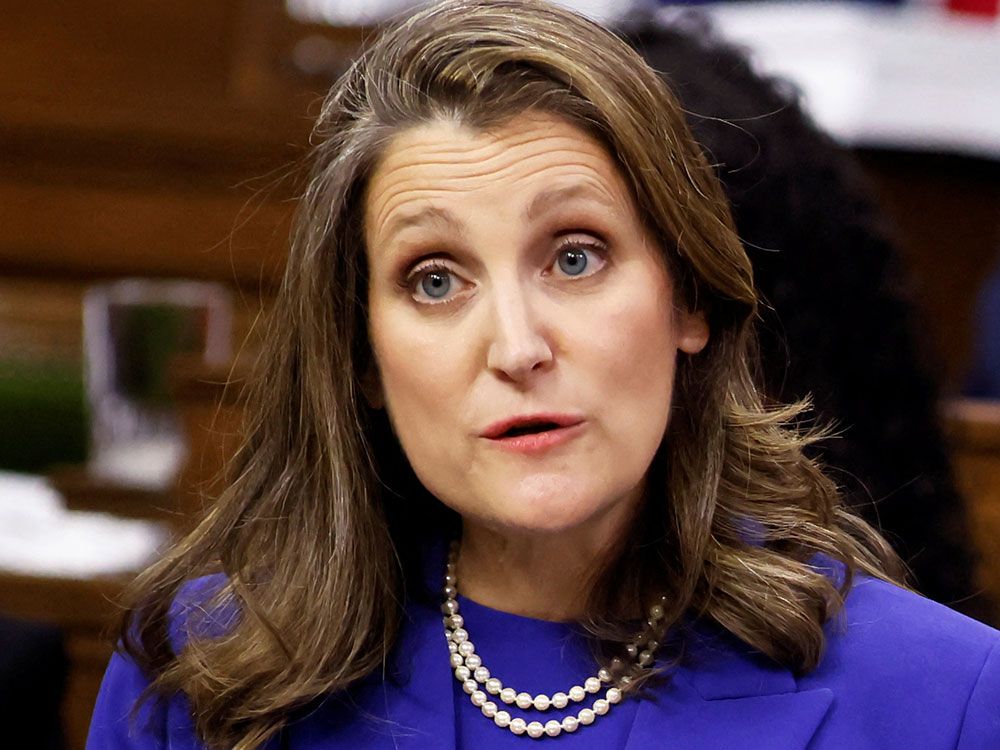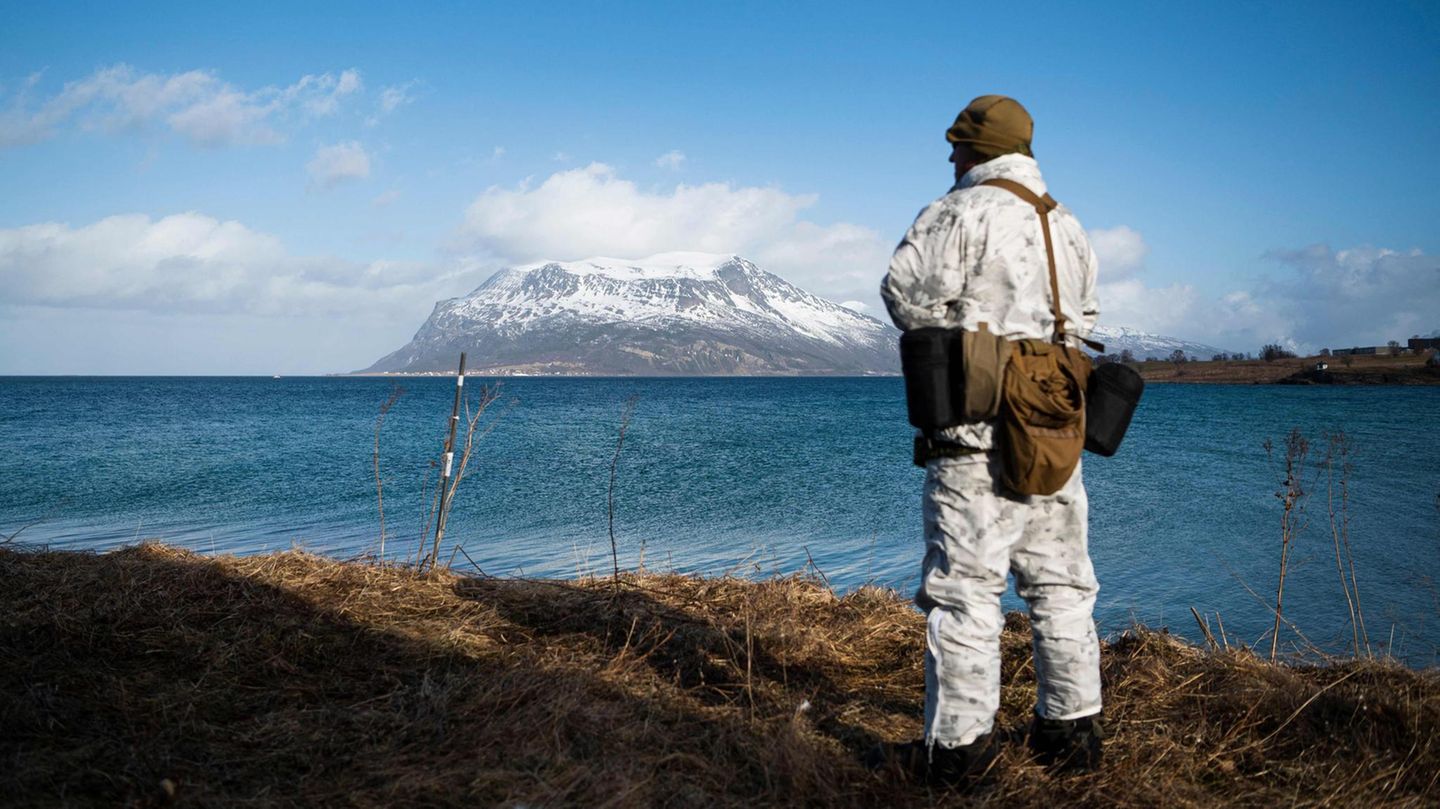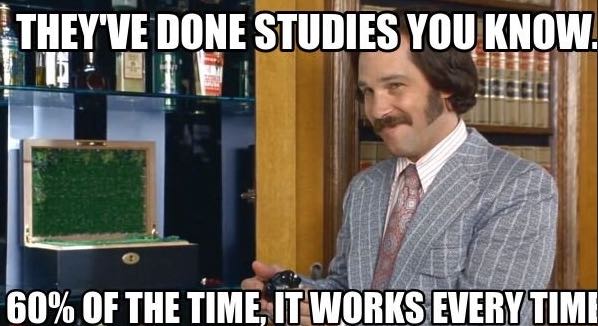Justin Trudeau hints at boosting Canada’s military spending
Canada says it will look at increasing its defence spending and tacked on 10 more Russian names to an ever growing sanctions list.
By Tonda MacCharles
Ottawa Bureau
Mon., March 7, 2022
Riga, LATVIA—On the 13th day of the brutal Russian bid to claim Ukraine as its own, Prime Minister Justin Trudeau is showing up at the Latvian battle group led by Canadian soldiers, waving the Maple Leaf and a vague hint at more money for the military.
Canada has been waving the NATO flag for nearly seven years in Latvia as a bulwark against Russia’s further incursions in Eastern Europe.
Canada stepped up to lead one of NATO’s four battle groups in 2015 — part of the defensive alliance’s display of strength and solidarity with weaker member states after Russia invaded Ukraine and seized the Crimean peninsula in 2014. Trudeau arrived in the Latvian capital late Monday after meetings in the U.K. with British Prime Minister Boris Johnson and Netherlands Prime Minister Mark Rutte.
Earlier Monday, faced with a seemingly unstoppable war in Ukraine, Trudeau said he will look at increasing Canada’s defence spending. Given world events, he said there are “certainly reflections to have.”
And Canada tacked on 10 more Russian names to an ever-growing sanctions list.
The latest round of sanctions includes names Trudeau said were identified by jailed Russian opposition leader and Putin nemesis Alexei Navalny.
However, on a day when Trudeau cited the new sanctions, and Johnson touted new measures meant to expose Russian property owners in his country, Rutte admitted sanctions are not working.
Yet they all called for more concerted international efforts over the long haul, including more economic measures and more humanitarian aid, with Johnson and Rutte divided over how quickly countries need to get off Russian oil and gas.
The 10 latest names on Canada’s target list do not include Roman Abramovich — a Russian billionaire Navalny has been flagging to Canada since at least 2017. Canada appears to have sanctioned about 20 of the 35 names on Navalny’s list.
The Conservative opposition says the Liberal government is not yet exerting maximum pressure on Putin, and should do more to bolster Canadian Forces, including by finally approving the purchase of fighter jets.
Foreign affairs critic Michael Chong said in an interview that Ottawa must still sanction “additional oligarchs close to President Putin who have significant assets in Canada.”
Abramovich owns more than a quarter of the public shares in steelmaking giant Evraz, which has operations in Alberta and Saskatchewan and has supplied most of the steel for the government-owned Trans Mountain pipeline project.
Evraz’s board of directors also includes two more Russians the U.S. government identified as “oligarchs” in 2019 — Aleksandr Abramov and Aleksandr Frolov — and its Canadian operations have received significant support from the federal government.
That includes at least $27 million in emergency wage subsidies during the pandemic, as well as $7 million through a fund meant to help heavy-polluters reduce emissions that cause climate change, according to the company’s most recent annual report.
In addition to upping defence spending, the Conservatives want NORAD’s early warning system upgraded, naval shipbuilding ramped up and Arctic security bolstered.
In London, Johnson sat down with Trudeau and Rutte at the Northolt airbase. Their morning meetings had a rushed feel, with Johnson starting to usher press out before Trudeau spoke. His office said later that the British PM couldn’t squeeze the full meeting in at 10 Downing Street because Johnson’s “diary” was so busy that day. The three leaders held an afternoon news conference at 10 Downing.
But before that Trudeau met with the Queen, saying she was “insightful” and they had a “useful, for me anyway, conversation about global affairs.”
Trudeau meets with NATO Secretary General Jens Stoltenberg Tuesday in Latvia.
The prime minister will also meet with three Baltic leaders, the prime ministers of Latvia, Lithuania and Estonia, in the Latvian capital of Riga.
The Liberals announced they would increase the 500 Canadian Forces in Latvia by another 460 troops. The Canadians are leading a multinational battle group, one of four that are part of NATO’s deployments in the region.
Another 3,400 Canadians could be deployed to the region in the months to come, on standby for NATO orders.
But Canada’s shipments of lethal aid to Ukraine were slow to come in the view of the Conservatives, and the Ukrainian Canadian community.
And suddenly Western allies are eyeing each other’s defence commitments.
At the Downing Street news conference, Rutte noted the Netherlands will increase its defence budget to close to two per cent of GDP. Germany has led the G7, and doubled its defence budget in the face of Putin’s invasion and threats. Johnson said the U.K. defence spending is about 2.4 per cent and declined to comment on Canada’s defence spending which is 1.4 per cent of GDP.
But Johnson didn’t hold back.
“What we can’t do, post the invasion of Ukraine is assume that we go back to a kind of status quo ante, a kind of new normalization in the way that we did after the … seizure of Crimea and the Donbas area,” Johnson said. “We’ve got to recognize that things have changed and that we need a new focus on security and I think that that is kind of increasingly understood by everybody.”
Trudeau stood by his British and Dutch counterparts and pledged Canada would do more.
He defended his government’s record, saying Ottawa is gradually increasing spending over the next decade by 70 per cent. Then Trudeau admitted more might be necessary.
“We also recognize that context is changing rapidly around the world and we need to make sure that women and men have certainty and our forces have all the equipment necessary to be able to stand strongly as we always have. As members of NATO. We will continue to look at what more we can do.”
The three leaders — Johnson, a conservative and Trudeau and Rutte, progressive liberals — in a joint statement said they “will continue to impose severe costs on Russia.”
Arriving for the news conference from Windsor Castle, Trudeau had to detour to enter Downing Street as loud so-called Freedom Convoy protesters bellowed from outside the gate. They carried signs marked “Tuck Frudeau” and “Free Tamara” (Lich).
Protester Jeff Wyatt who said he has no Canadian ties told the Star he came to stand up for Lich and others who were leading a “peaceful protest” worldwide against government “lies” about COVID-19 and what he called Trudeau’s “tyranny.”
Elsewhere in London, outside the Russian embassy, other protesters and passersby reflected on what they said was real tyranny — the Russian attack on Ukraine. “I think we should be as tough as possible to get this stopped, as tough as possible,” said protester Clive Martinez.
Canada says it will look at increasing its defence spending and tacked on 10 more Russian names to an ever growing sanctions list.
By Tonda MacCharles
Ottawa Bureau
Mon., March 7, 2022
Riga, LATVIA—On the 13th day of the brutal Russian bid to claim Ukraine as its own, Prime Minister Justin Trudeau is showing up at the Latvian battle group led by Canadian soldiers, waving the Maple Leaf and a vague hint at more money for the military.
Canada has been waving the NATO flag for nearly seven years in Latvia as a bulwark against Russia’s further incursions in Eastern Europe.
Canada stepped up to lead one of NATO’s four battle groups in 2015 — part of the defensive alliance’s display of strength and solidarity with weaker member states after Russia invaded Ukraine and seized the Crimean peninsula in 2014. Trudeau arrived in the Latvian capital late Monday after meetings in the U.K. with British Prime Minister Boris Johnson and Netherlands Prime Minister Mark Rutte.
Earlier Monday, faced with a seemingly unstoppable war in Ukraine, Trudeau said he will look at increasing Canada’s defence spending. Given world events, he said there are “certainly reflections to have.”
And Canada tacked on 10 more Russian names to an ever-growing sanctions list.
The latest round of sanctions includes names Trudeau said were identified by jailed Russian opposition leader and Putin nemesis Alexei Navalny.
However, on a day when Trudeau cited the new sanctions, and Johnson touted new measures meant to expose Russian property owners in his country, Rutte admitted sanctions are not working.
Yet they all called for more concerted international efforts over the long haul, including more economic measures and more humanitarian aid, with Johnson and Rutte divided over how quickly countries need to get off Russian oil and gas.
The 10 latest names on Canada’s target list do not include Roman Abramovich — a Russian billionaire Navalny has been flagging to Canada since at least 2017. Canada appears to have sanctioned about 20 of the 35 names on Navalny’s list.
The Conservative opposition says the Liberal government is not yet exerting maximum pressure on Putin, and should do more to bolster Canadian Forces, including by finally approving the purchase of fighter jets.
Foreign affairs critic Michael Chong said in an interview that Ottawa must still sanction “additional oligarchs close to President Putin who have significant assets in Canada.”
Abramovich owns more than a quarter of the public shares in steelmaking giant Evraz, which has operations in Alberta and Saskatchewan and has supplied most of the steel for the government-owned Trans Mountain pipeline project.
Evraz’s board of directors also includes two more Russians the U.S. government identified as “oligarchs” in 2019 — Aleksandr Abramov and Aleksandr Frolov — and its Canadian operations have received significant support from the federal government.
That includes at least $27 million in emergency wage subsidies during the pandemic, as well as $7 million through a fund meant to help heavy-polluters reduce emissions that cause climate change, according to the company’s most recent annual report.
In addition to upping defence spending, the Conservatives want NORAD’s early warning system upgraded, naval shipbuilding ramped up and Arctic security bolstered.
In London, Johnson sat down with Trudeau and Rutte at the Northolt airbase. Their morning meetings had a rushed feel, with Johnson starting to usher press out before Trudeau spoke. His office said later that the British PM couldn’t squeeze the full meeting in at 10 Downing Street because Johnson’s “diary” was so busy that day. The three leaders held an afternoon news conference at 10 Downing.
But before that Trudeau met with the Queen, saying she was “insightful” and they had a “useful, for me anyway, conversation about global affairs.”
Trudeau meets with NATO Secretary General Jens Stoltenberg Tuesday in Latvia.
The prime minister will also meet with three Baltic leaders, the prime ministers of Latvia, Lithuania and Estonia, in the Latvian capital of Riga.
The Liberals announced they would increase the 500 Canadian Forces in Latvia by another 460 troops. The Canadians are leading a multinational battle group, one of four that are part of NATO’s deployments in the region.
Another 3,400 Canadians could be deployed to the region in the months to come, on standby for NATO orders.
But Canada’s shipments of lethal aid to Ukraine were slow to come in the view of the Conservatives, and the Ukrainian Canadian community.
And suddenly Western allies are eyeing each other’s defence commitments.
At the Downing Street news conference, Rutte noted the Netherlands will increase its defence budget to close to two per cent of GDP. Germany has led the G7, and doubled its defence budget in the face of Putin’s invasion and threats. Johnson said the U.K. defence spending is about 2.4 per cent and declined to comment on Canada’s defence spending which is 1.4 per cent of GDP.
But Johnson didn’t hold back.
“What we can’t do, post the invasion of Ukraine is assume that we go back to a kind of status quo ante, a kind of new normalization in the way that we did after the … seizure of Crimea and the Donbas area,” Johnson said. “We’ve got to recognize that things have changed and that we need a new focus on security and I think that that is kind of increasingly understood by everybody.”
Trudeau stood by his British and Dutch counterparts and pledged Canada would do more.
He defended his government’s record, saying Ottawa is gradually increasing spending over the next decade by 70 per cent. Then Trudeau admitted more might be necessary.
“We also recognize that context is changing rapidly around the world and we need to make sure that women and men have certainty and our forces have all the equipment necessary to be able to stand strongly as we always have. As members of NATO. We will continue to look at what more we can do.”
The three leaders — Johnson, a conservative and Trudeau and Rutte, progressive liberals — in a joint statement said they “will continue to impose severe costs on Russia.”
Arriving for the news conference from Windsor Castle, Trudeau had to detour to enter Downing Street as loud so-called Freedom Convoy protesters bellowed from outside the gate. They carried signs marked “Tuck Frudeau” and “Free Tamara” (Lich).
Protester Jeff Wyatt who said he has no Canadian ties told the Star he came to stand up for Lich and others who were leading a “peaceful protest” worldwide against government “lies” about COVID-19 and what he called Trudeau’s “tyranny.”
Elsewhere in London, outside the Russian embassy, other protesters and passersby reflected on what they said was real tyranny — the Russian attack on Ukraine. “I think we should be as tough as possible to get this stopped, as tough as possible,” said protester Clive Martinez.





